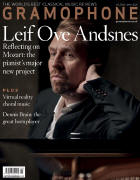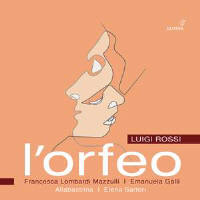Texte paru dans: / Appeared in: |
|
|
Outil de traduction (Très approximatif) |
|
|
Reviewer: David Vickers When the nepotistic Barberini fell from grace after the death in 1644 of Pope Urban VIII, the deceased pontiff’s nephews fled into Parisian exile as guests of Cardinal Mazarin (chief minister of the six-year-old Louis XIV). Their musician Luigi Rossi went with them, so Mazarin commissioned Orfeo (1647) to inaugurate the remodelled Palais Royal theatre (22 years later the home of the original Paris Opéra). Francesco Buti’s libretto reinvents the tale of Euridice’s death on her wedding day from a poisonous snakebite and Orfeo’s doomed mission to bring her back from Hades, but focuses much less on Orfeo than on the jealousy of Aristeo, who is rejected by the steadfast Euridice even as she dies; taunted by her ghost, he commits suicide. Mixed into the action is an assortment of scheming deities and their sidekicks, Euridice’s anxious father Endimione, priests predicting disaster, and cynical comic interjections from a satyr, an old lady and a nurse. A reduced score copied about 30 years later (containing voice and continuo parts) is in the Vatican library, and a few pieces from Rossi’s opera were still being printed in France at the end of the century, but these problematic musical sources raise issues about how to prepare suitable performing material for a modern revival. William Christie (Harmonia Mundi, 3/92) presented one possible way of reconstructing Rossi’s score, and a lavishly interventionist treatment of an abridged text was adopted by Raphaël Pichon for Jetske Mijnssen’s staging at the Opéra National de Lorraine (Harmonia Mundi, 2017). Allabastrina present a welcome all-Italian view. Industrious continuo players (archlute, theorbo, harp, dulcian and harpsichord/organ) are joined from time to time by a consort of four viols (waspish in timbre), the same number of violins and a pair of recorders; additional strings play occasionally in ritornellos and sinfonias. Intrusions by two percussionists are seldom convincing. However, Elena Sartori sensibly eschews the creative licence of Pichon’s cornettos, trombones and trumpet, and presents the complete text including the Prologue flattering the child Louis XIV, several ballets and an epilogue for Mercury. Sartori’s compound of zest and chiaroscuro is broadly effective and the full-blooded dramatic directness of her approach means that Rossi’s melting pot of techniques and styles comes across loudly and clearly. Choruses of Augurs, Graces, Dryads, Furies, Bacchantes and Celestials aim for robust colour rather than contoured finesse. Several chamber ensembles cultivate perceptive rhythmical fluency (eg the madrigalian trio ‘Al fulgor di due bei rai’, Act 1 scene 1), but elsewhere the panoply of sopranos tend to sing with pointed hardness and unreliable intonation – even Rossi’s exquisite lullaby ‘Dormite, begli occhi, dormite’ (Act 2 scene 9) is brittle rather than beguiling. Emanuela Galli sings with articulate suppleness: the descending chromatic bass line of Euridice’s ‘Mio ben teco il tormento’ is treated like a quick Spanish dance, never settling on a regular pulse. Paola Valentina Molinari conveys Aristeo’s roller-coaster journey from despairing melancholy to insanity and suicide. Francesca Lombardi Mazzulli’s full-throttle Orfeo makes copious sacrifices to secure tuning, but there is compelling passion in Act 3’s opening triple-whammy of grief-stricken laments (with viols), bitter soliloquies and exchanges with a trio of insensitively trite Fates. Glossa, usually an exemplary label in every respect, neglects to include a translation of the libretto – just as it recently did not provide one for Melani’s L’empio punito (1/21). These complex and intriguing 17th-century Italian dramas deserve to be understood. |
|




